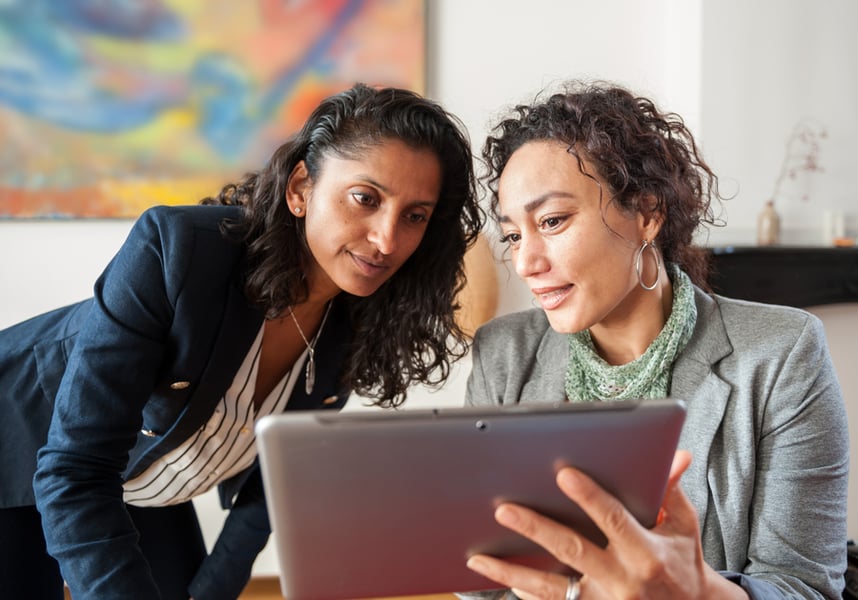

What if first-mover advantage was a team sport?
The Material Change Institute aims to find out.
Underrepresented investors — women, ethnic minorities, those who identify as LGBTQ, veterans and those from disadvantaged backgrounds — find it nearly impossible to break into the top tiers of private equity and venture capital. Meanwhile, top-tier investors complain that they’d be happy to include individuals from underrepresented groups — if they just knew some.
Eve Blossom’s big idea is to break that chicken-and-egg dilemma by concentrating on the eggs: investors who have money and purpose but lack connections and the technical expertise to convert those connections to investments. Material Change, the nonprofit she founded, is part of a growing ecosystem determined to draw underrepresented groups in and up in through all veins of asset management.
Over at The Fourth Floor, a platform and community intended to cultivate women for corporate board seats, the “Back Room” connects investors with startups and private equity. Carrie Colbert, founder of Curate Capital, said that women comprise 80% of the investors in her first, $15 million round, which closed last summer. The average investment for the 90 investors was $160,000. Colbert is pressing forward for a second round this summer.
A report released Feb. 6 by Cerulli Associates indicates that efforts to qualify and pull in underrepresented investors is congruent with asset managers’ ambitions to find and hire diverse staff. About 28% of institutional investment firms have hired at least one “diverse manager,” Cerulli found, with another 10% intending to do so. The same priority is playing out with product development, with 37% of asset managers informing Cerulli that they do or intend to offer investments that explicitly address DEI and gender issues.
Blossom launched Material Change in October 2021 with small group of “fellows” who immerse in workshops and training to sharpen their abilities to craft deals. Now, with a second flight of fellows taking wing, she has discovered that peer relationships are an underestimated accelerant: Program participants are investing in each other's opportunities and sharing connections among themselves.
Material Change investors bring their own career experiences, skills and perspectives, and decide in the course of the program if they want to apply their investing ambitions by becoming angel investors, starting their own funds, or joining existing funds as managers.
“Every day that diversity is not at the table is a lost opportunity to uncover that value,” Blossom said. “We’re focused on all the different paths” for underrepresented people to gain a foothold in the investing ecosystem.
Blossom’s own “aha moment” came when she was worked over the past two decades at various startups and realized that the people she usually mentored and advised looked very much alike. As she co-founded Future Family, a digital platform that supported families’ pursuit of fertility, she decided that her next venture would concentrate on cultivating investors from underrepresented backgrounds who wanted to invest In companies that resonated with their values, but who didn’t know where to start — or with whom.
Ayori Selassie, a member of the first group, spread the word among her own network of Black women, introducing them to Material Change and other programs. Now she's raising her own fund through Life Model Ventures and is a limited partner investor in CapitalizeVC, a fund founded by a Black woman general partner who invests in Black founders.
“After I invested in that first deal, I thought, ‘This is what I should be doing,’” said Selassie. “Getting involved with cap tables, it increased my potential to grow my wealth and allows me to get involved in companies where I can strategically aid them. Now I have incredible people in my network — diverse networks — and these organizations need the benefit of that talent.”
Evolving tools document the expanding spectrum of companies led by women, illustrating the growing need for women investors whose strategies are informed by their own professional and personal perspectives. The distribution of industries in the Hypatia Women CEO Index runs counter to the stereotypical perception that women typically lead consumer companies: Consumer categories comprise 16% of the index; infotech, 12%; financial services, 16%; and industrial, 17%. The index is made up of publicly held companies with a minimum market capitalization of $500 million, and an associated ETF launched in January.
Programs like Material Change fuel an upward spiral of integrating qualified women investors into the investment mainstream, Selassie said.
“They’re looking for me, as a woman of African descent,“ she said. “For me, personally, going through the Material Change process, I had a huge identity shift ... from being a person who wants to invest to being a person who’s deploying other people’s capital, and making companies grow and making change in the world.”

Relationships are key to our business but advisors are often slow to engage in specific activities designed to foster them.

Whichever path you go down, act now while you're still in control.

Pro-bitcoin professionals, however, say the cryptocurrency has ushered in change.

“LPL has evolved significantly over the last decade and still wants to scale up,” says one industry executive.

Survey findings from the Nationwide Retirement Institute offers pearls of planning wisdom from 60- to 65-year-olds, as well as insights into concerns.
Streamline your outreach with Aidentified's AI-driven solutions
This season’s market volatility: Positioning for rate relief, income growth and the AI rebound
